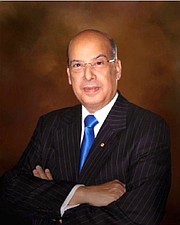By SIR RONALD SANDERS
BY 2030, it is more than likely that the eight independent Commonwealth countries which are still monarchical states, with Queen Elizabeth II as their Sovereign, will become Republics.
In doing so, the eight countries will join the other four Commonwealth Caribbean countries that have already separated from the Queen, approving one of their citizens as President.
The eight remaining monarchies are: Antigua and Barbuda, The Bahamas, Belize, Grenada, Jamaica, St Kitts-Nevis, St Lucia and St Vincent and the Grenadines. Countries that are already Republics are: Barbados, Dominica, Guyana and Trinidad and Tobago. Of the latter four, only Guyana has an Executive President who is directly elected by the electorate. In the other three countries, the President, carries out largely ceremonial duties.
In those countries that have converted to Republican status with non-executive Presidents, the role of the President is no different in substance to the duties performed by a Governor-General. The simple but fundamental difference is that the Head of State is not a person, living in a distant land and who is not participating in the daily concerns of the society. The further important difference is that the Head of State is not also the hereditary Sovereign of Britain, the country that exercised colonial control for centuries.
The anachronism of the Sovereign of Britain also being the Sovereign of Caribbean states has long been recognized in the region. The reluctance to undertake the change to a Republic, with a President drawn from the citizenry of the country, is the consequence of concern about the political advantage that could be sought by political parties during national debate, leading to a referendum to decide the matter.
When a referendum was held in St Vincent and the Grenadines in 2009, it became politically contentious with speculation about the motivation of the Government of Prime Minister Dr Ralph Gonsalves. Suggestions were also made that the country would lose investment from foreigners who would be concerned about perceived protections that would be lost by separation from the Queen. The referendum in St Vincent and the Grenadines failed.
The Government of Barbados was able to sidestep a referendum on the change from Monarchy to Republic because the country’s constitution did not require a referendum. This was also the case in Dominica, Guyana and Trinidad and Tobago. Parliamentary majorities by the governing parties ensured change without contentious public party-political debate that would most certainly have fomented national division.
Guyana is the only one of the four Republics that has an executive Presidency directly elected by the electorate. In 1970, four years after its independence from Britain, its parliament voted for the country to become a Republic with a ceremonial President as is now the case in the other three Commonwealth Caribbean Republics. However, a new constitution was promulgated in 1980, abolishing the ceremonial Presidency and replacing it with an Executive President who is elected in Presidential elections every five years.
The problem that the eight remaining monarchies face is that their constitutions require them to hold referenda to effect a change to Republican status. And, unless consensus is secured by all political parties in each country to endorse Republican status and publicly declare that position in writing, any referendum would become an opportunity for political dispute.
Undoubtedly, this was why Jamaica’s elder statesman, PJ Patterson, wrote to the Prime Minister and the Leader of the Opposition in December 2021, calling on them to agree to a non-partisan referendum, saying: “It would be a spectacular contribution to building our parliamentary democracy; permitting both Parties to share a single platform in a Campaign to secure National approval and allow one of our own image to become Head of State”.
The course open to the present Prime Ministers of the eight monarchical states is to start discussions with the leaders of all political parties in each of their states to agree on the transition to Republican status and on the type of Presidency they want - ceremonial or executive. They would also have to reach broad agreement on consequential changes that would have to be made to their existing constitutions and on checks and balances on the exercise of power. All of this could be inscribed in a Memorandum of Understanding.
If the political parties could reach such consensus, their Memorandum of Understanding could then be given to a team of legal experts to draft a new Constitution for their review and agreement. Once this further agreement is reached, the political parties could then hold town hall meetings, virtual meetings and utilize both traditional and social media platforms to inform their citizens about the new constitution and their status as Republics.
It should not be beyond leaders of political parties who acknowledge the anachronism of remaining monarchies to advance this national aspiration. It would be the most non disruptive approach to completing the process of independence in each of these countries.
And, while they are taking action to become Republics, they could simultaneously include in their countries’ referenda the decision to end the relationship with the British Privy Council in favour of the Caribbean Court of Justice.
None of this would be an insult to the Queen who is universally respected in the Commonwealth Caribbean and whose efforts to serve the people of these countries, even from the distance of Britain, has been deeply appreciated.
The time has simply come to manifestly end the Caribbean’s long history of association with Britain as a colonial power, transforming the relationship to a partnership of cooperation with a Commonwealth sister-nation.
• Responses and previous commentaries: www. sirronaldsanders.com.
(The writer is Antigua and Barbuda’s Ambassador to the United States and the OAS. He is a Senior Fellow at the Institute of Commonwealth Studies, University of London and Massey College in the University of Toronto. The views expressed are his own)






Commenting has been disabled for this item.